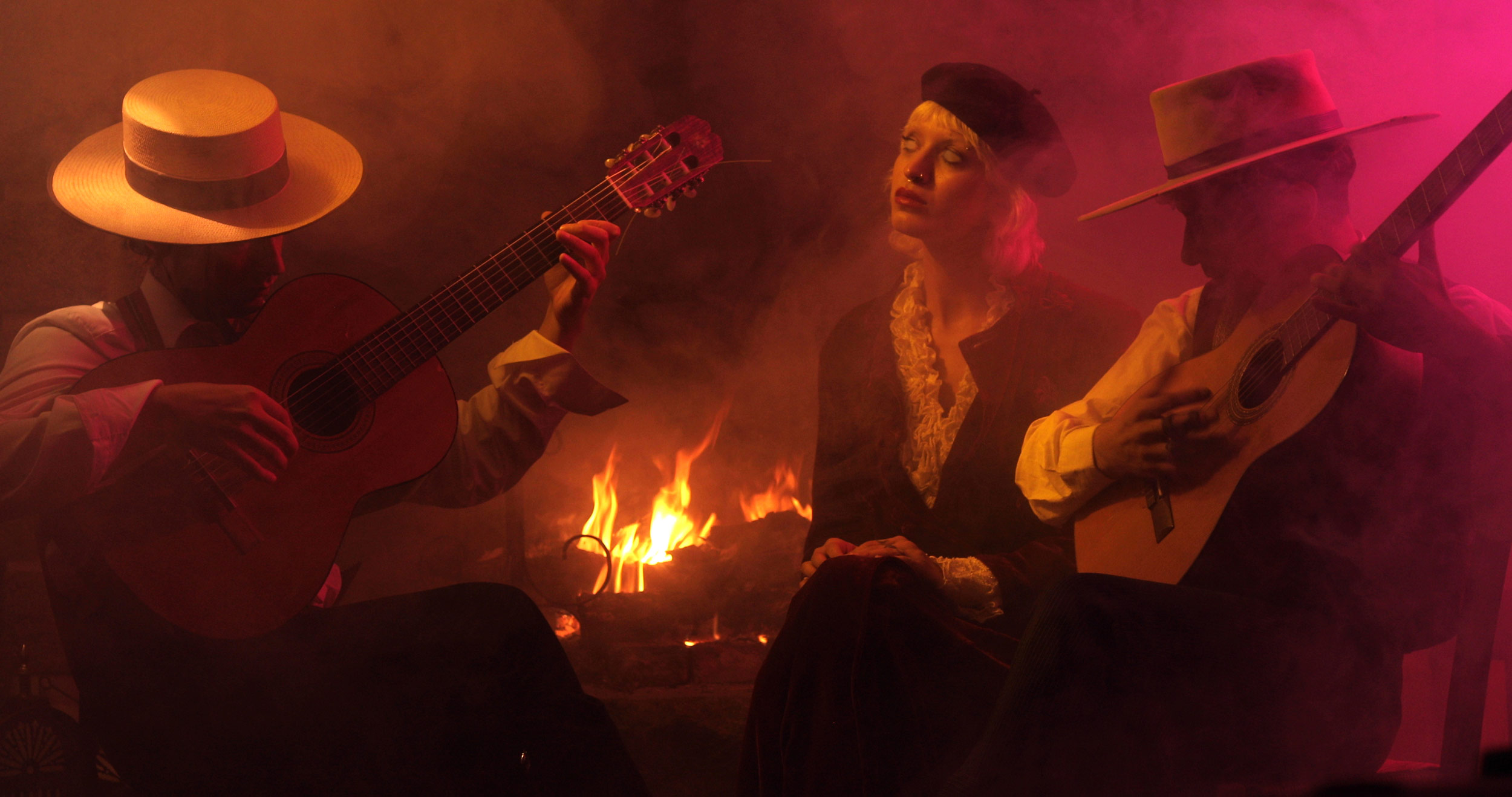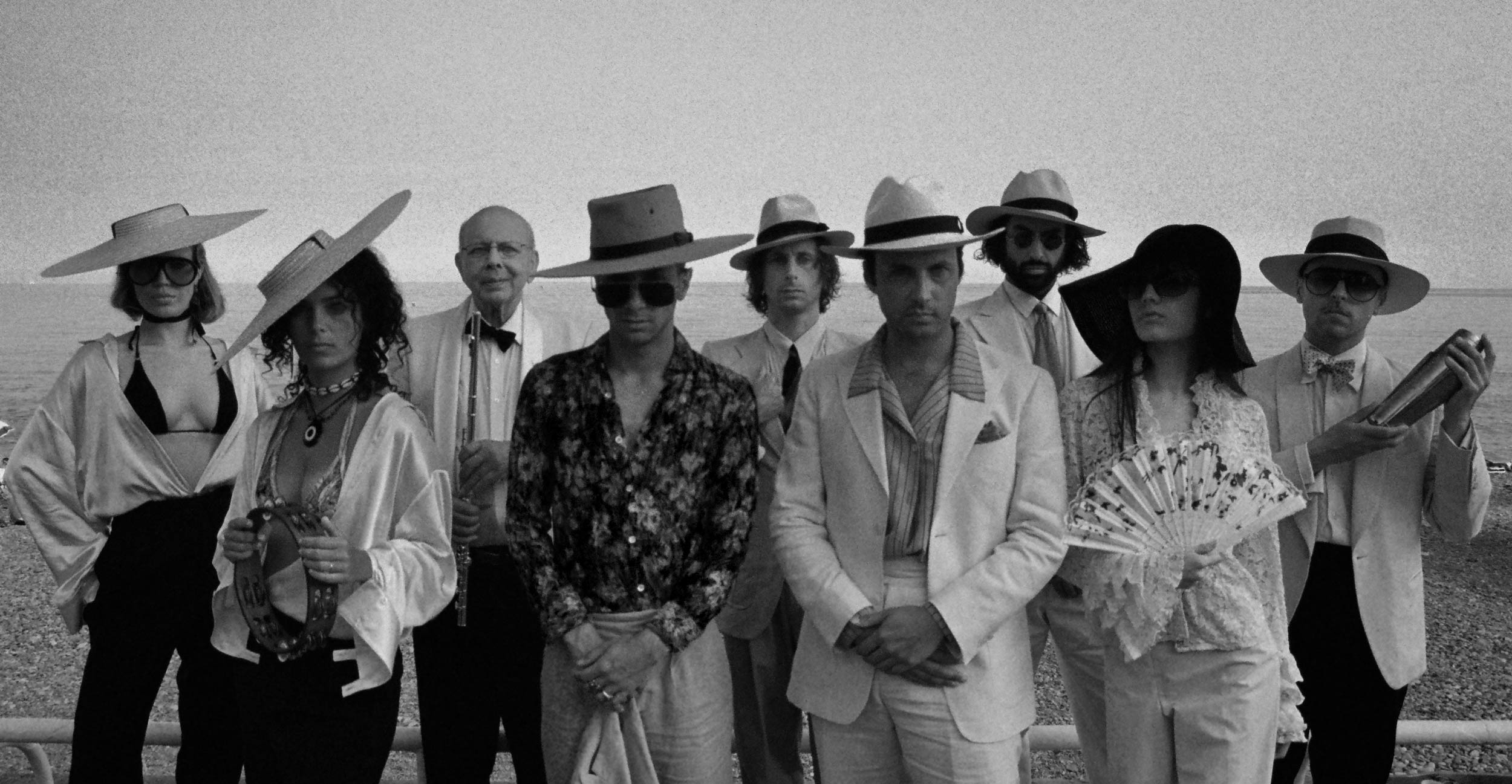After years of travel in Spain and Mexico, the band mixes its signature psych-pop style with flamenco and Spanish lyrics for a commentary-as-comedy effect
The Phrygian musical mode is a flexible key. It can invoke Andalusian bullfighting, Yom Kippur, or Aladdin, and with just a slight adjustment of the fingers, a skilled practitioner can travel between moods. The short distance between E and F—just a half step— gives a listener the ability to travel across space, and explore the world of Middle Eastern influence. At any moment, you might think you are in one place—but in truth, you are on your way to the next.
The French band La Femme has long-existed in a world where space contracts. To negotiate a record deal in France, they toured the US; to stand out among French bands, they sang—wait for it—in French; they draw on surf rock and Spaghetti Western to garner national attention; and on their last album, Paradigmes, they dipped their toes into Spanish lyrics for one song, “Le jardin.” It was a successful experiment that gave them the confidence to record their new album, Teatro Lucido, entirely in Spanish.
Teatro Lucido draws on the Spanish Phrygian mode. Reggaeton beats and Flamenco guitars nod to the culture behind their language of choice, and they complement the band’s signature psych-pop sound across the album.
Listening to La Femme has always been a heady enterprise, and one could spend hours trying to navigate all the allusions and jokes. There are a lot of jokes. The music video for “Sacatella,” the lead single of Teatro Lucido, depicts a day on a Spanish yacht gone terribly wrong. Is it slapstick comedy or ironic critique? You have to parse all the hints and insinuations to know for sure.
At times, the band’s many references—Spaghetti Western, Alejandro Jodorowsky, Rosalia, Woody Allen—force listeners to ask themselves if they are in on the joke. That the art is commentary-as-comedy is obvious, but the point La Femme tries to make is less clear.
Speaking before the release of Teatro Lucido, Sacha Got—one of La Femme’s founders—offered little additional clarity, claiming that the album is simply a tribute to the band’s travels through Spain and Mexico. Throughout the interview, he seemed to tell me that this album is really good music, in Spanish, and that I shouldn’t think too hard about what it means. Of course, that is what someone who is making critical art would say to a reporter.
Try as I might to follow Got’s instructions, I thought about the album’s meaning. I came up void of concrete thoughts, but full of positive feelings about the album, and about the band’s broader vision—whatever it is. Teatro Lucido is noir with a wink. Just when you think they are building to a serious point, they will cut the motif, and drop in a fun drum and bass section, or a new grimy bassline—anything to keep you off balance.
What I can report with confidence is that the band was inspired by recent travels—and that in those travels, they felt seen. Seen, perhaps, in the same way we feel when listening to the album—that is, if we’re in on the joke.
Sacha Got: Teatro Lucido is a place we discovered in Mexico that we love. We [got] very familiar with the place and the owner, Wendy Moira. She’s doing crazy parties, like weird theater parties—Jodorowsky-style—and we used to play there a lot and sleep there. It’s a big space with some beds around, but everybody’s sleeping in the same room. It’s kind of like an artistic residency for crazy people, and we thought it would be a good homage to call the record [Teatro Lucido].
Tani Levitt: Is there one particular travel story that especially influenced the album?
“In France, when I was a teenager, like 75 percent of the bands were singing in English. So we began to sing in French. Now, everybody is singing in French… We’re like, Okay, let’s sing in Spanish.”
Sacha: There were many, many of them, but one of the weirdest moments was when I went to a city called Gibraltar in the south of Spain. It’s part of Britain, but it’s basically in the south of Andalusia.
It was very crazy, in the middle of a Spanish trip, to go to a place where people speak English, [and are] eating fish and chips. It was another dimension—like, another country, another time, and it’s very weird and confusing.
Tani: Things were not as you expected with the trumpet player on the opening track, right?
Sacha: We tried so many trumpet players—eight or nine for the first song. We wanted something very specific, and it was hard to find it. In Mexico, some people [would] say to us, ‘Oh, I’m gonna introduce you to the best mariachi player in town,’ and when he [played], it was so bad. Finally, in France, we found a guy. I love this instrument, and I loved to be at the recording session, looking at the guy getting all red because I asked them to [play] so loud. But I love the results.
Tani: You, a French band, open Teatro Lucido—an album sung entirely in Spanish—with ‘Fugue Italienne.’ There’s a lot going on there!
Sacha: Yeah, it’s true. I mean, we put it as the first song because I think it was the best song to put out as the first song. It’s really an introduction to a big show coming. We called it ‘Fugue Italienne’—it’s simple, I began to [write] it when I was in Italy.
It made me think about Spaghetti Western. [An] Italian movie with American actors shot in Spain, so it’s a lot going on. [They were] Italian people trying to do American Western, with this America composer who is very Italian. But you can’t [classify] it in any styling and stuff. And they shot [the film] in Spain and it’s for like the Italian market but for the American market too. So I think we are in the same approach.
Tani: So choosing to sing in Spanish was part of that approach?
Sacha: I made this trip to Spain in 2018. And I did a trip of three months [to Mexico]. That’s where I began to write the songs, and when I began to speak Spanish, because I was just by myself, hanging out with Spanish people.
In France, when I was a teenager, like 75 percent of the bands were singing in English. Everybody was just trying to seem like they were The Strokes. So we began to sing in French. Now, everybody is singing in French, which is fun. We’re like, Okay, let’s sing in Spanish. It’s funny, and more original.
Tani: You’ve said that ‘Sacatella,’ the first single, is about unacknowledged desires and pursuing dreams. Did you write the song from that place—of having pursued dreams and acknowledged desires? Is that narrator actually you?
Sacha: We wrote this in the press [release], but it’s not really like this. At the beginning, it came from a joke. Some friends were singing sacatela—which means [take] it out. We began to write the lyrics around this sentence. You, drunk, singing with a friend with a guitar, then it becomes a song. We have many songs that come like this at the beginning.











